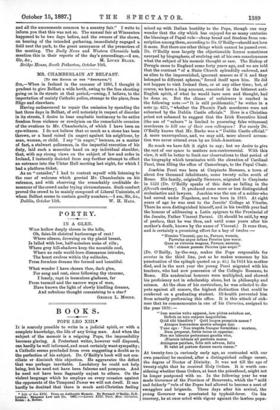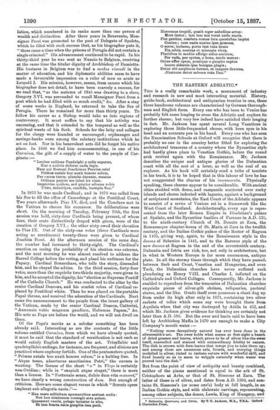BOOKS.
POPE LEO =A IT is scarcely possible to write in a judicial spirit, or with a complete knowledge, the life of any living man. And when the subject of the memoir is a reigning Pope, the impossibility becomes glaring. A Protestant writer, however well disposed, can hardly be well informed, and must certainly want sympathy; a Catholic seems precluded from even suggesting a doubt as to the perfection of his subject. Dr. O'Reilly's book will not con. ciliate or diminish this objection. He aggravates the defect that was perhaps inevitable. ,Laudatory he could not help being, but he need not have been fulsome and pompons. And he need not have been flagrantly unjust to others. On the violent language which he employs on every occasion against the opponents of the Temporal Power we will not dwell. It can hardly be doubted that there is much anti-Christian feeling
• Life of loon-IL Pram an Authentic Memoir. By Bernard O'Reilly, D.D. London: Sampson Low and Co. 18e7.—Leonia MI'. Pont. Max. Carmine. Roma: A Befani. mixed up with Italian hostility to the Pope, though one may wonder that the city which has enjoyed for so many centuries the blessings of Papal rule—cheap bread and freedom from con- scription among them, according to Dr. O'Reilly—should not love it more. But there are other things which cannot be passed over. Dr. O'Reilly uses largely the objectionable license sometimes usurped by biographers, of evolving out of his own consciousness what the subject of his memoir thought or saw. The Bishop of Perugia came to England some forty years ago, and we are told that the contrast "of a State Church splendidly endowed, and as alien to the impoverished, ignorant masses as if it and they belonged to different spheres," forced itself upon him. He did not happen to visit Ireland then, or at any other time; but, of course, we have a long account, conceived in the bitterest anti- English spirit, of what he would have seen and thought, had he done so. But the climax of unfairness is reached in the following note :—" It is still problematic," he writes in a note (p. 425), "whether the Phcenix Park murderers were not suborned by the Dublin Castle officials." Here is a Christian priest not ashamed to suggest that the Irish Executive hired (the use of " suborn " is limited to procuring false witnesses) murderers to Sill one of their own colleagues ! For surely Dr. O'Reilly knows that Mr. Burke was a "Dublin Castle official." A more unscrupulous, and, we may add, more absurd accusa- tion was never uttered even by an Irish-American.
So much we have felt it right to say; but we desire to give the rest of our space to matters non-controversial. With this view, it will be better to limit our observations to that period of the biography which terminates with the elevation of Cardinal Peed, then filling the office of Camerlengo, to the Papal Chair.
Joachim Pecci was born at Carpineto Romano, a town of about five thousand inhabitants, some twenty miles south of Rome. His family, originally Siennese, migrated to Carpineto in 1523 (Dr. O'Reilly speaks of this date as falling in the fifteenth century). It produced some more or less distinguished ecclesiastics and lawyers. Joachim was the son of a soldier who had served under Napoleon, and was born in 1810. At eight years of age he was sent to the Jesuits' College at Viterbo. There he soon distinguished himself, and in his twelfth year had the honour of addressing a Latin epigram to the Provincial of the Jesuits, Father Vincent Pavani. (It should be said, by way of preface, that he was then, and until some years after his mother's death, known by the name of Vincent.) It runs thus, and is certainly a promising effort for a boy of twelve
"Nomine Vinoenti, goo to, Pavane, vocaris,
Parvalrus atque infans Peecius ipso vocor. Qoas es virtntes magmas, Pavane, seentus, Oh! utinam possem Porcine ipse sequi!"
(Dr. O'Reilly, by-the-way, makes the Pope responsible for seculas in the third line, just as he makes nonsense by his punctuation of the epitaph quoted on p. 45.) In 1824 his mother died, and in the next year the young Pecci migrated with his teachers, who had now possession of the Collegio Romano, to Rome. His academical honours were multiplied, and showect his proficiency not in scholarship alone, but in philosophy and science. At the close of his curriculum, he was selected to dis- pute against all corners, the highest distinction that could be conferred on a graduating student. Ill-health prevented him from actually performing this office. It is this attack of sick- ness that he commemorates in one of his Carmina, assigned to the year 1830 :— " Iam mocies voila apparet, lam pietas anhelmn eat,
Deficie en toto corpora languidulos.
Quid tibi blandiris ? quid longoa prospicia acmes ?
Atropos borrow:1nm mortis adurget her.
Tune ego 'Nan trepida frangar formidine TO MOTO, Duns properat, fortis lictris et opperiar.
Non use Mantis pertentant gaudia vine, lEternis inhians nil peritura moror.
Attingens patriam, felix erit advena, felix Si valet ad pcutum ducere nauta retina."
At twenty-two (a curiously early age, as contrasted with our own practice) he received, after a distinguished college career, the degree of Doctor of Divinity. It was not till the age of twenty-eight that he received Holy Orders. It is worth con- sidering whether these Orders, at least the priesthood, might not be longer postponed with us. In the following year he was made Governor of the Province of Benevento, which the "mild and fatherly" rule of the Popes had allowed to become a neat of smugglers and brigands. Three days after his arrival, the young Governor was prostrated by typhoid-fever. On his recovery, he at once acted with vigour against the lawless popn.
lation, which numbered in its ranks more than one person of wealth and distinction. After three years in Benevento, Mon- signor Pecci was promoted to the post of Delegate of Spoleto, which he filled with such success that, as his biographer puts it,
there came a time when the prisons of Perugia did not contain a single criminal." His advancement continued to be rapid. In his thirty-third year he was sent as Nuncio to Belgium, receiving at the same time the titular dignity of Archbishop of Damietta. His business in Belgium was to find a modus vivendi in the matter of education, and his diplomatic abilities seem to have made a favourable impression on a ruler of men so acute as Leopold I. His mission, however, seems, from causes which his biographer does not detail, to have been scarcely a success, for we read that, "as the autumn of 1845 was drawing to a close, Gregory XVI. was persuaded to recall Monsignor Peed from a post which he had filled with so muds credit," /sc. After a stay of some weeks in England, he returned to take the See of Perugia. There he remained for more than thirty years. To follow his career as a Bishop would take us into regions of controversy. It must suffice to say that his activity was 'unceasing, and that it extended to the temporal as well as the spiritual wants of his flock. Schools for the laity and colleges for the clergy were founded or encouraged ; orphanages and savings-banks were among the salutary institutions which he set on foot. Nor in his benevolent acts did he forget his native place. In 1868 we find him commemorating, in one of his Varmina, the gift of a supply of water to the people of Car- pineto :— " Leniter exiliens Paudnlplit a cello imperil°,
Hue a nativis del ever ands ingie.
Nam qui Romani Joachimus Peccins ostri Primus natale hoc auxit honors Holum, Per moos term, plumb° decente, meatus Oblitam patria3 me iubet ire viam.
Improvise quidem, sed gratior advena vobis Intro, manicipes, candida, inempta flue."
In 1853 he was made Cardinal; and in 1876 was called from bis See to fill the office of Camerlengo at the Pontifical Court, Two years afterwards Pius IX, died, and the Conclave met in the Vatican to choose his successor. Its deliberations were short. On the morning of Tuesday, February 19th, the first session was held, sixty-four Cardinals being present, of whom four, their seats distinctively draped with green, were of the creation of Gregory XVI. ; the other sixty owed their elevation to Pine IX. Out of the sixty-one votes (three Cardinals were acting as scrutineers) twenty-three were given to Cardinal Joachim Peed. At the afternoon session of the same day, the number had increased to thirty-eight. The Cardinal's emotion on seeing the probability of his election was extreme, and the next morning he was almost resolved to address the Sacred College before the voting, and plead his unfitness for the Papacy. Cardinal Bonnechase, who tells the story, dissuaded him, and he obeyed the advice. In the third session, forty-four votes, more than the requisite two-thirds majority, were given to him, and he accepted the dignity, his "election as Supreme Pontiff of the Catholic Church." He was conducted to the altar by the senior Cardinal Deacons, and his scarlet robes of Cardinal re- placed by Pontifical white. Then be was placed on the portable Papal throne, and received the adoration of the Cardinals. Next -came the announcement to the people from the inner gallery of the Vatican, made by the senior Cardinal Deacon, Catterini, "Annancio vobis magnum gaudium, Habemns Papam," die. His acts as Pope are before the world, and we will not dwell on them.
Of the Pope's merits as a scholar something has been already said. Interesting as are the contents of the little volume entitled Oarmina, from which we have already quoted, it must be said that the standard of versification is not such as would satisfy English masters of the art. Trisyllabio and quadrisyllabic endings, for instance, are frequent, and elisions are practised where euphony forbids. One of the pentameters quoted, Primus natale hoc auxit honore solum," is a halting line. In Atqae tenes, adserturns sauctissima Petri," the cassura is
wanting. The license of the short " o " in Virgo is certainly non-Ovidian ; while in " euspicit atque stnpet," there is more than a license. In "Fortunate sem; dulde dum vita mancret," we have clearly a wrong construction of duns. But enough of criticism. Here are some elegant verses in which " &mods opem implorat sub alleged& navis:"—
"Sea mare sollieitum spumantibus aestuat male:
Nor hen nimbesum contegit atra polum. Qaassatur ventis, pelago iaotatur in alto, Et lam fraote ratis gurgitis boa petit. Horremus trepidi, bluetit mger anhelitus arias: More insist; iam jam nos vorat nada mark. Plot genitor, resoluta comae Inca qneetabns impish
COI:litli ; cum nada attains ipso gemens, 0 sorer, inclamo, porta tam tote beato
Eia &dais, nostras et miaerata vices, Fluotibus in =alibi affalge sides amioum, Per vada, per eyries, o bona, made menus: Oates affer opera, pontiqne s gnrgite raptos 'Deere sidereis ipse benign& plagis ; Debar ithi amplexas iterare, et iungere desires, 2Eternum detur solvers vote Des."



































 Previous page
Previous page